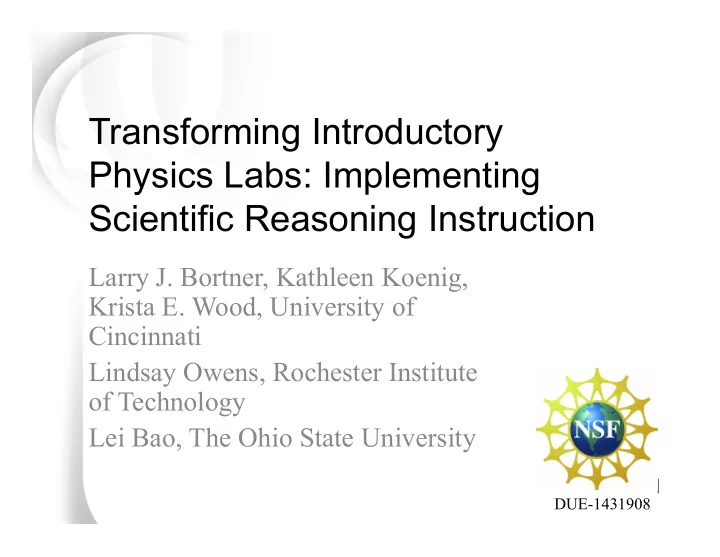

Transforming Introductory Physics Labs: Implementing Scientific Reasoning Instruction Larry J. Bortner, Kathleen Koenig, Larry J. Bortner, Kathleen Koenig, Krista E. Wood, University of Cincinnati Lindsay Owens, Rochester Institute of Technology Lei Bao, The Ohio State University DUE-1431908
Traditional Physics Lab • Attempt to synchronize with lecture (topics always addressed first in lecture). • Summary of pertinent topics. • Goal: verify equations and concepts. • • Cookbook approach: Cookbook approach: – What data to take and how to take it. – What to analyze and how to analyze it. • Answers given. • Full lab report expected for each experiment in term.
Promote Scientific Reasoning ( SR ) as a Filter for Students Domains: Subset of Control of variables critical thinking Proportional reasoning Correlations Integrated hypothesis testing Integrated hypothesis testing Foundation of Foundation of Hypothetical deductive SR skills Statistical reasoning Causation reasoning Skills measured with iSTAR assessment (extension of CTSR). istarassessment.org
COV Progression Bloom’s Presented with a scenario, students must… Taxonomy Understand- Decide if experimental design is valid with two testable variables. Interpret Design a controlled experiment if there are more than two variables. Apply- Decide if a variable is testable when it is actually testable (more than two variables Implement present). Decide if a variable is influential when it is testable & influential. Analyze- Decide if a variable is testable when it is testable (two variables present). Decide if a variable is testable when it is testable (two variables present). Differentiate Differentiate Decide if a variable is testable when it is not testable. Decide if several variables are testable when some are influential & hidden relations Create- Putting exist. elements Decide if several variables are influential when some are influential & hidden together to relations exist generate prediction Predict outcome by deciding if a variable is influential when it is influential. Wood, K. E. (2015). Evolution of Scientific Reasoning in Control of Variables for Undergraduate Physics Lab . Dissertation.
First Semester Physics Labs Developed to Instill… Thinking like a scientist. Exploring and predicting. Posing a testable question. Designing experiments. Designing experiments. Collecting data to answer a question. Interpreting data through graphs, identifying patterns. Sharing data as a research community (whiteboards). Engaging in evidence-based reasoning & argumentation when writing lab reports.
iSTAR Physics Lab • Flipped classroom, structured/guided inquiry- based. • Pre-lab reading material and online quiz. • In lab student groups of • In lab student groups of three or four, instructor engages Socratically, checkpoints. • Handwritten Lab Records graded with rubric. • Four lab reports over term.
Group Whiteboard Results Challenge Lab Report Lab Report Lab Group Whiteboard Results Challenge Lab Report Lab Report Challenge Lab Lab
Results at UC Staggered iSTAR Post Scores iSTAR Gains Across 12 Labs 55% 20% 50% 15% 45% 10% Pre-Test Algebra & Calculus Algebra & Calculus 40% 5% Physics I Labs, Physics I Labs, 16FS, 17SS, 17FS, 16FS, 17SS, 17FS, 18SS; N=2161 18SS; N=2161 Pre-Test 35% 0% 0 4 8 12 0 4 8 12 Week of Semester Week of Semester
Current Status • Concentration has been on Control of Variables skills. • Working to expand statistical and causal reasoning scaffolding and instruction. reasoning scaffolding and instruction. • Looking to share SR curricular framework. – We will work with you to adapt your labs.
Thank You! Time to Wake Up! Questions? Larry.Bortner@uc.edu Krista.Wood@uc.edu Kathy.Koenig@uc.edu
Recommend
More recommend